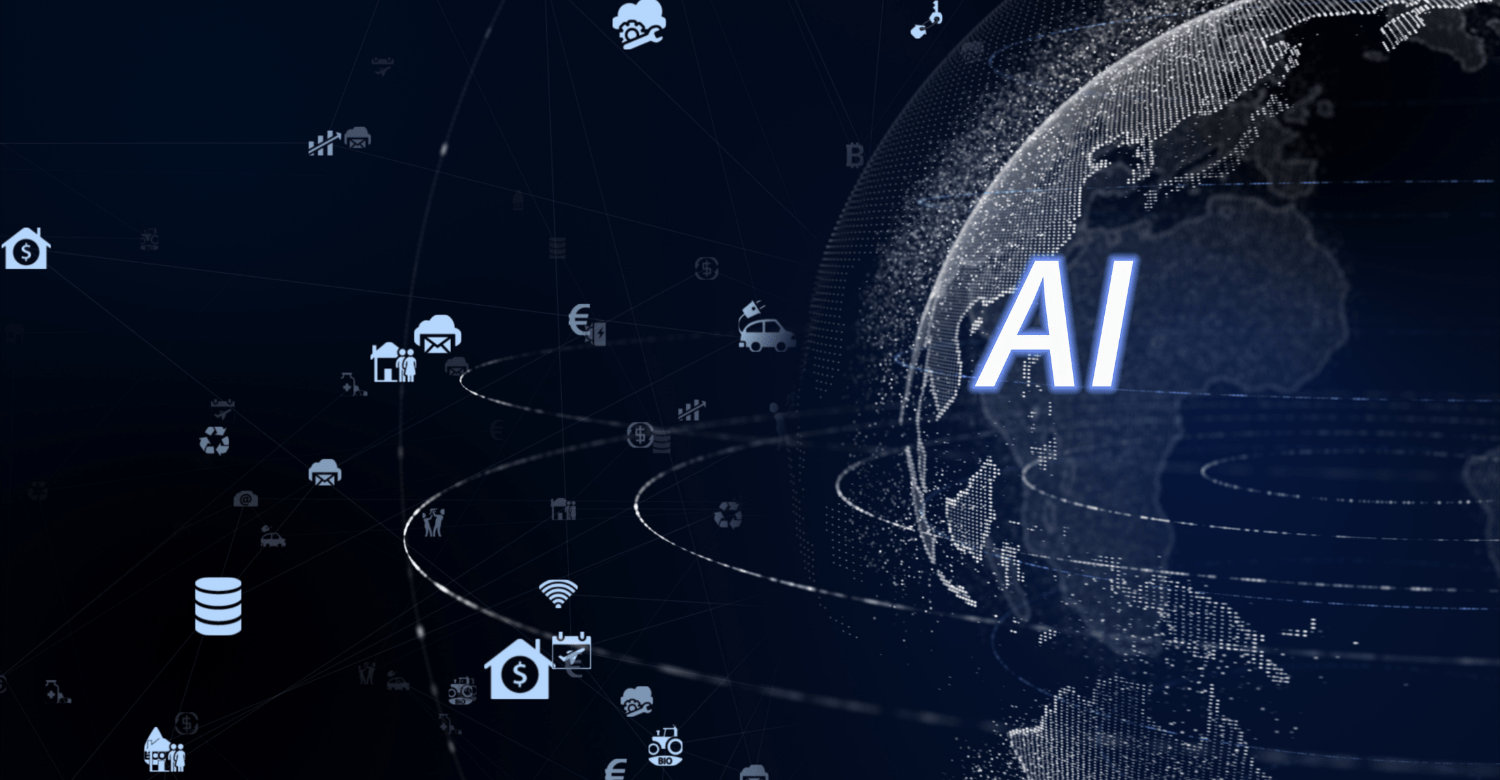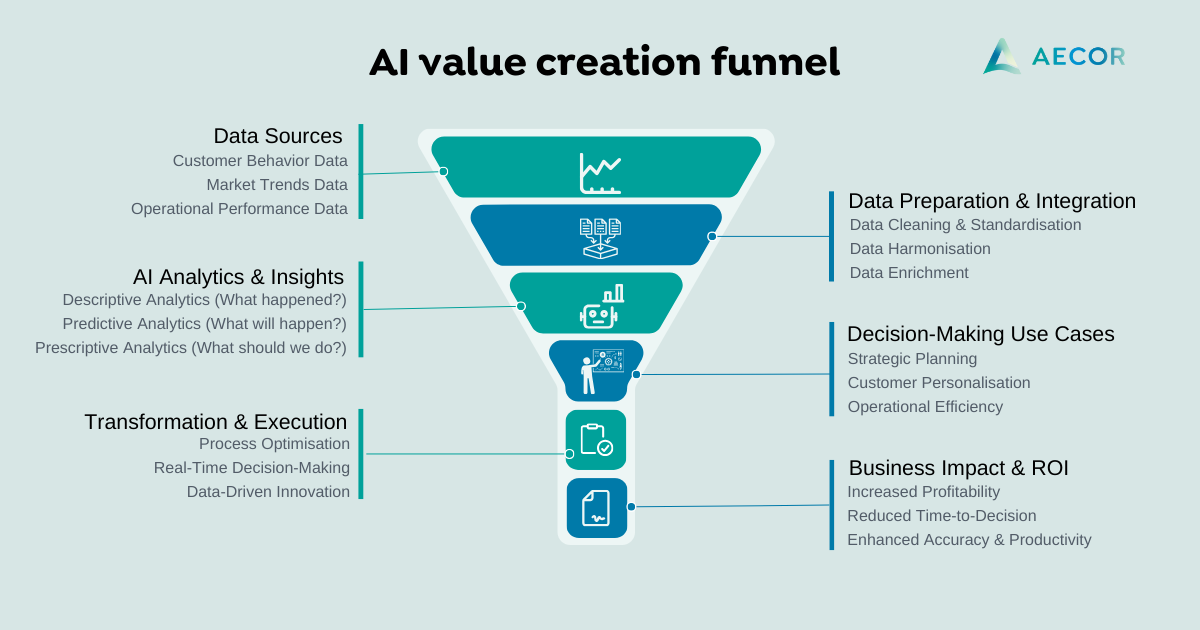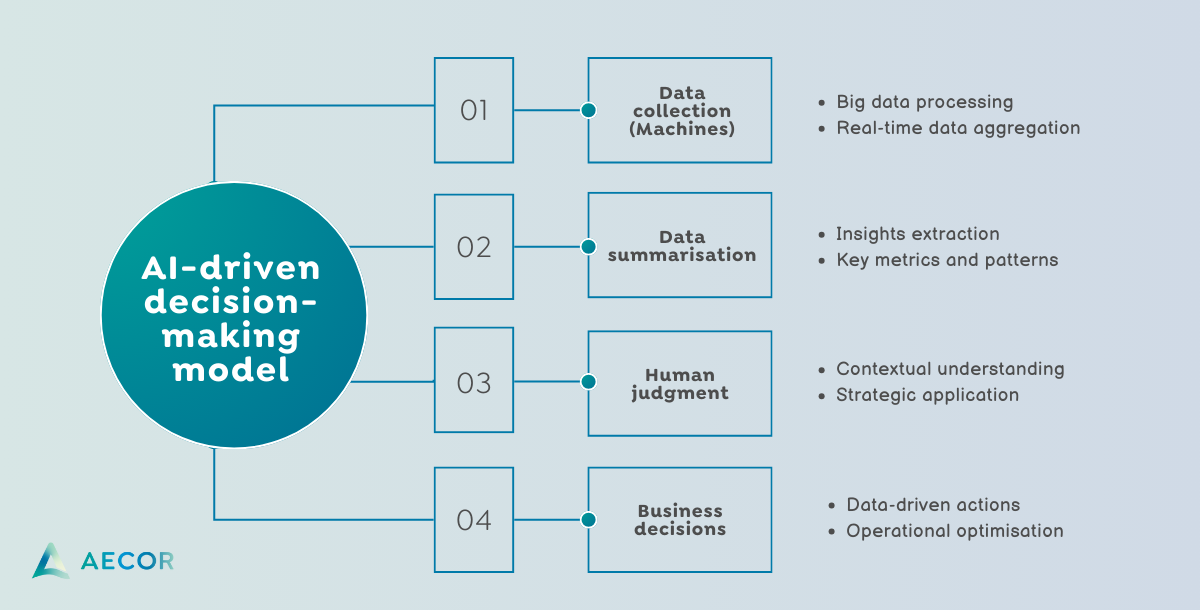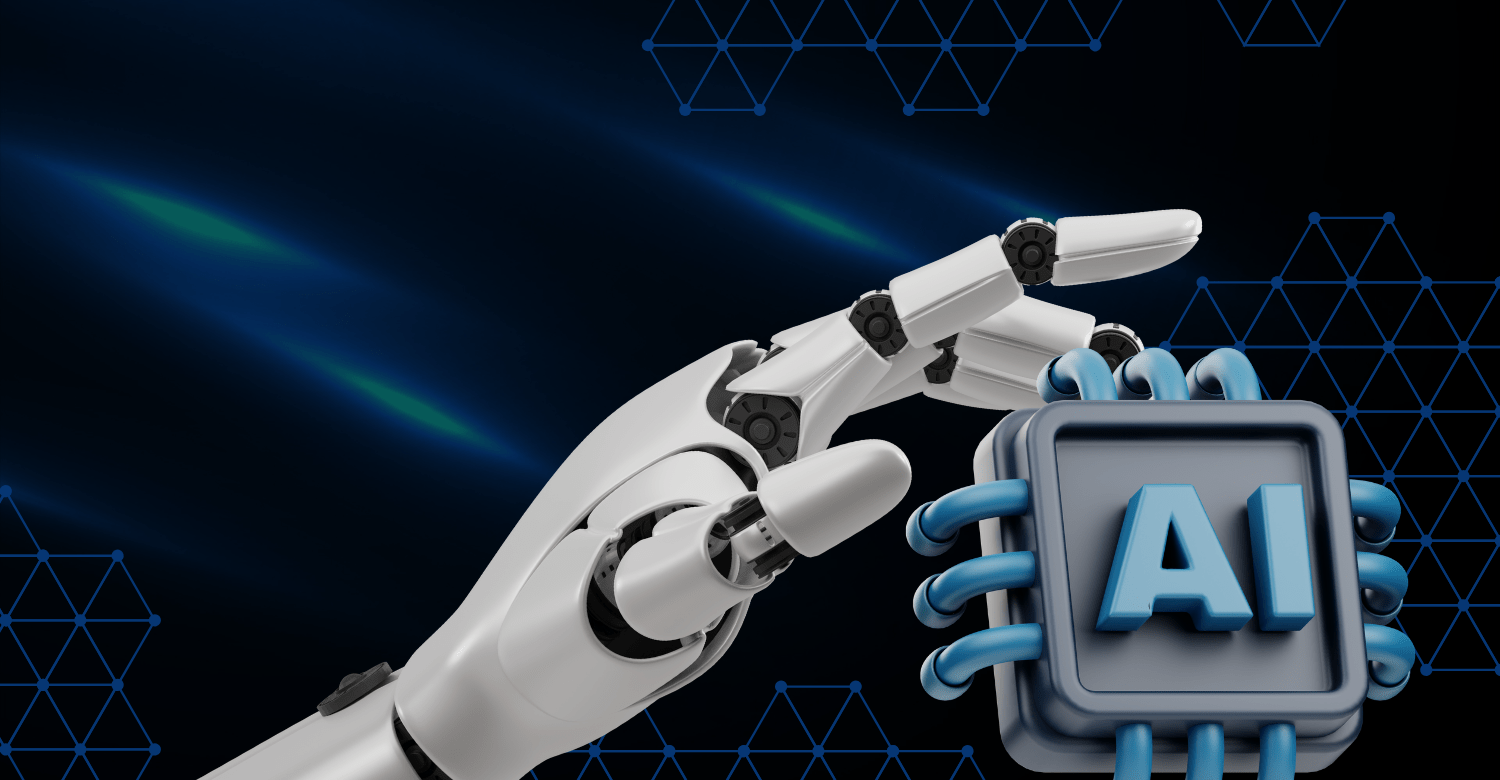How AI is transforming decision-making in business

Imagine a world where businesses could predict customer preferences, forecast market trends, and optimise operations with unparalleled accuracy—all in real-time. That’s not the future; it’s happening now, thanks to Artificial Intelligence (AI). Whether it’s a small startup refining its product offerings or a global enterprise strategising for the next fiscal year, AI has become an indispensable partner in the decision-making process.
This article will explore how AI transforms business decision-making by enhancing speed, accuracy, and strategic insights. We’ll cover its key benefits, real-world applications across industries, challenges to watch out for, and emerging trends shaping its future. By the end, you’ll understand how AI can become a strategic partner in driving growth and innovation.
A paradigm shift in decision-making
Traditional business decisions often rely on gut instinct, experience, or fragmented data. While these methods have worked for centuries, they are no match for the complexity of modern markets. AI brings an unprecedented level of precision and speed, enabling businesses to make informed, data-backed decisions that drive success.
A report by PwC estimates that AI could contribute up to $15.7 trillion to the global economy by 2030. This potential stems from AI’s ability to process massive datasets, identify patterns, and predict outcomes faster and more accurately than any human could.
The power of data: AI’s decision-making backbone
In the digital age, data is often referred to as the “new oil,” and rightly so. AI thrives on data—massive volumes of it. Every interaction, transaction, or social media comment contributes valuable data points that fuel the AI engine, allowing businesses to generate actionable insights, automate processes, and make informed decisions with precision. Without data, AI systems would lack the foundation to deliver their transformative capabilities.
Consider some real-world examples of how businesses are leveraging data-driven AI systems:
- Retail Giants: Amazon has revolutionised the online shopping experience with its AI-powered recommendation engine. By analysing customers’ browsing history, purchase behaviour, and preferences, AI suggests products that are not only relevant but also highly personalised. This tailored shopping experience has been credited with driving a staggering 35% of Amazon’s total sales, according to a report by McKinsey. This example illustrates how AI can turn raw data into a strategic advantage, boosting revenue and customer satisfaction.
- Finance Leaders: In the world of finance, data security and fraud detection are critical. JP Morgan Chase employs sophisticated AI algorithms to monitor and analyse real-time transactions for unusual patterns or anomalies. By doing so, the bank can detect fraudulent activities within seconds, saving billions of dollars annually. This demonstrates how AI transforms data into a shield that enhances trust and minimises risk in sensitive industries.
- Healthcare Innovations: In healthcare, data is not just transformative—it’s life-saving. AI-driven tools like IBM Watson analyse vast medical datasets, including patient histories, diagnostic records, and research papers. By identifying patterns and correlations, these tools assist doctors in diagnosing diseases with an accuracy rate exceeding 90%, significantly reducing the likelihood of misdiagnoses. Such advancements not only improve patient outcomes but also streamline healthcare processes, making them more efficient and reliable.
These examples emphasise that data, when combined with AI, becomes a powerhouse for strategic decision-making across industries. Retailers can predict customer preferences and optimise inventories, financial institutions can secure transactions and prevent losses, and healthcare providers can improve diagnoses and patient care.
However, the power of AI isn’t just about crunching numbers. It’s about turning raw data into meaningful insights that drive growth, efficiency, and innovation. The more data AI systems have access to, the smarter and more impactful they become. This synergy between data and AI is transforming businesses, enabling them to stay competitive in an increasingly complex and fast-paced world.
Key benefits of AI in business decisions
Speed and Efficiency AI accelerates decision-making processes by rapidly analysing vast amounts of data in real time, allowing businesses to react to challenges and opportunities with unprecedented speed. According to a study by Deloitte, organisations that adopt AI-driven decision-making reduced their decisions by 30%, enabling them to stay ahead in competitive markets.
For instance, logistics firms like DHL have integrated AI into their operations to optimise delivery routes. AI systems analyse traffic patterns, weather conditions, and delivery schedules to predict the most efficient routes, shaving hours off schedules and saving millions in costs annually. This not only improves customer satisfaction but also reduces fuel consumption, aligning with sustainability goals.
Accuracy and reduced errors AI significantly minimises human error, particularly in repetitive and data-heavy tasks. In industries such as manufacturing, where precision is critical, AI-powered quality control systems excel at identifying defects that human inspectors might miss. Siemens, for example, employs AI-driven quality control solutions that use image recognition to detect flaws in real time. This has led to a 40% reduction in defect rates, improving product reliability and customer trust.
In addition, AI enhances accuracy in financial services, where systems like JP Morgan’s “COiN” platform process billions of transactions, identifying anomalies with greater precision than traditional methods. This prevents financial errors and bolsters compliance with regulatory standards.
Identifying hidden opportunities One of AI’s most transformative abilities is uncovering patterns and insights buried deep within datasets that humans would likely overlook. This capability opens doors to hidden opportunities, driving innovation and strategic growth.
For example, Spotify leverages AI to analyse the listening habits of its 551 million users. By identifying patterns in genres, time of day, and user preferences, AI curates personalised playlists and song recommendations that keep users engaged and loyal. This personalised experience is a cornerstone of Spotify’s growth strategy.
Similarly, in retail, AI helps businesses forecast demand, enabling them to stock the right products at the right time. Tesco, a leading supermarket chain, uses AI-driven analytics to predict consumer behaviour during peak seasons, reducing stockouts by 30% and waste by 20%.
These examples demonstrate how AI enhances speed, accuracy, and strategic insight, transforming how businesses make decisions. By leveraging AI, organisations can optimise operations, reduce risks, and seize opportunities in ways that were previously unimaginable.
Real-world applications of AI in decision-making
Artificial Intelligence (AI) has become integral to decision-making across various industries, enhancing efficiency, accuracy, and personalisation. Here are some real-world applications:
Retail: Predictive analytics
Retailers utilise AI to forecast inventory requirements, optimise stock levels and minimise waste. For instance, Tesco employs AI-driven demand forecasting to anticipate customer needs during seasonal peaks, resulting in a 30% reduction in stockouts and a 20% decrease in waste.
Healthcare: Diagnostics and treatment
AI assists in the early detection and diagnosis of diseases, improving patient outcomes. A collaboration between Google Health and the NHS led to the development of an AI system capable of identifying breast cancer with greater accuracy than human radiologists. This advancement holds promise for more reliable and timely diagnoses.
Finance: Risk assessment
Financial institutions are embracing AI to better understand and manage risks in their investments. BlackRock’s Aladdin platform, a leading AI-powered risk management system, analyses global market data to identify patterns, assess potential risks, and provide actionable insights. While BlackRock itself manages $8 trillion in assets through Aladdin, the platform’s reach extends globally, with over $20 trillion in assets being managed by various institutions using this powerful tool.
This widespread adoption highlights how AI is transforming risk assessment and ensuring smarter decision-making in the financial sector.
Marketing: Personalisation at scale
Artificial Intelligence (AI) has revolutionised marketing by enabling personalised campaigns that resonate with individual customer preferences. Adobe Sensei, Adobe’s AI and machine learning platform, empowers businesses to analyse customer behaviour and deliver tailored marketing experiences. This personalisation has led to a 20% increase in return on investment (ROI) for Adobe’s clients, fostering stronger customer engagement and loyalty.
For instance, FoodCloud Plus, a leading online grocery platform, utilised Adobe Sensei to analyse customer purchasing patterns. By understanding individual preferences, they crafted personalised marketing campaigns that significantly boosted customer retention and sales.
These examples highlight how AI-driven personalisation enhances marketing effectiveness, leading to increased ROI and customer satisfaction.
Challenges: Not without its risks
Despite its promise, AI isn’t flawless. Issues such as algorithmic bias, data privacy concerns, and over-reliance on automation pose significant challenges. A Harvard Business Review article highlighted that 42% of businesses faced ethical dilemmas when implementing AI, emphasising the need for transparency and ethical oversight.
The future of AI in decision-making
As AI continues to evolve, its impact on decision-making will deepen. Emerging trends include:
- Generative AI: Tools like OpenAI’s ChatGPT are being used to brainstorm strategies and craft content.
- AI-Blockchain Integration: Enhancing transparency and security in decision-making processes.
- Human-AI Collaboration: Combining human intuition with AI precision to achieve optimal outcomes.
As reported by Gartner, AI-powered demand forecasting has become the most popular application in supply chain planning. Currently, 45% of companies are already utilising this technology, and another 43% plan to implement it within the next two years.
A strategic partner, not a replacement
AI isn’t here to replace human decision-makers but to augment their capabilities. It provides clarity in complexity, turning data into actionable insights. Businesses that embrace AI today are not just staying competitive—they’re defining the future. At Aecor, we understand the transformative potential of AI and work to seamlessly integrate it into strategies that empower businesses to thrive.
The question isn’t whether businesses should adopt AI but how effectively they can integrate it into their decision-making frameworks. In a world driven by speed, data, and precision, AI is the compass guiding businesses toward innovation and growth, and Aecor is here to help navigate that journey.
What our clients say














